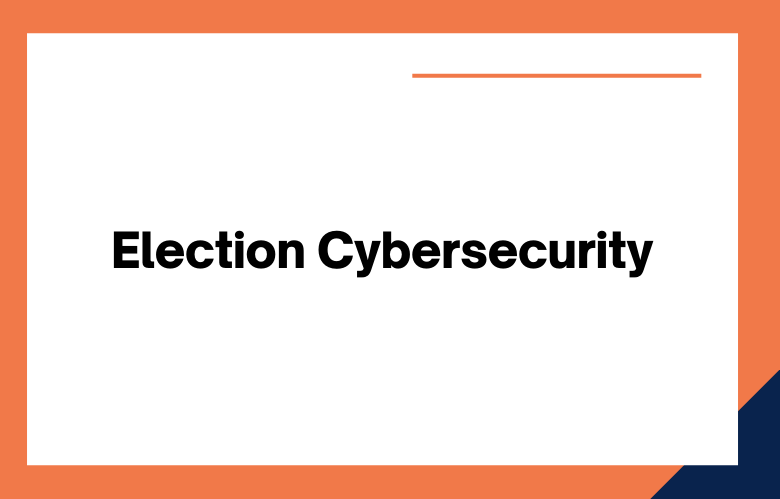Cybersecurity experts have sounded the alarm about potential cyberattacks against voting systems and other critical infrastructure. The fear is that hackers could interfere with the voting process or even tamper with election results.
With all the attention focused on election cybersecurity, now is an excellent time to review the basics of how to protect your computer and online accounts from being hacked.
What is Election Cybersecurity?
Election Cybersecurity protects electoral systems, data, and processes against cyber-attacks. It is a field that has become increasingly relevant as elections are held across various countries.
Elections are a part of democracy. Democracy is the idea that people have a say in running their country. Therefore, it’s essential to protect election systems from attack and manipulation.
Cybersecurity is always a hot topic, especially during elections.
Election cybersecurity is a term used to describe the electronic systems involved in casting and counting votes.
Cybersecurity protects computer hardware, software, and data from attack, damage, or unauthorized access. Cyber security includes protecting information on individual devices and networks of computers.
Election cybersecurity refers to the measures taken during elections, whether a national or local election, to secure and protect voting booths from any tampering.
Election cybersecurity is the protection of electronic systems used in voting and elections. Election cyber security includes protecting against attacks on infrastructure and safeguarding individual devices from hacking or tampering.
Protecting Against Election Cyber Attacks
With threats becoming more common every day, it is essential to protect against them to preserve our democracy.
- Encourage your friends to vote early or by mail.
- Have a plan for voting if you are unable to go in person on election day, such as asking a friend or family member to pick up an absentee ballot for you
- If possible, change the address on your driver’s license so that any correspondence from the DMV goes directly to your current address instead of being forwarded back to wherever it was initially sent.
- Create a plan
- Update software and systems
- Train staff on cybersecurity best practices
- Get cyber insurance to cover losses from hacking or data breaches
- Encourage your friends to vote early or by mail
- Have a plan for voting if you are unable to go in person on election day, such as asking a friend or family member to pick up an absentee ballot for you
- Educate yourself on the latest cyber threats
- Encrypt sensitive data and protect passwords with strong, unique passwords
- Install a firewall to block unauthorized access to your computer or network
- Use anti-virus software, firewalls, and malware protection programs to minimize the risk of infection from harmful content online
- Create a plan for what to do if your organization is hacked
- Encrypt sensitive data and use strong passwords
- Use multifactor authentication when possible
- Create a voter registration list
- Make sure your staff members are trained on how to recognize phishing emails and other cyber attacks.
- Encrypt sensitive data that is stored electronically
- Train your employees on what to do if they suspect an attack or have been attacked by hackers
- Monitor for any suspicious activity- this could include unusual traffic, unauthorized access, or insecure passwords
- Use a password manager and change passwords regularly
- Be aware of phishing emails, which can be disguised as an email from a bank or other company you use
- Watch out for spam text messages that contain links leading to malicious websites or ask for personal information
- Be wary of phishing emails and links
- Turn off your phone’s Bluetooth when you’re not using it
- Change your passwords regularly, mainly if you use the same password for multiple accounts
- Use a VPN to browse the web privately and securely
- Stay informed about potential cyber attacks
- Install anti-virus software on your devices and keep it updated
- Use strong passwords with different characters, numbers, and symbols
- Encrypt sensitive data on your computer or device
- Add an extra layer of security by installing a firewall program to protect against unauthorized access to your network.
- Encrypt your data
- Use a password manager to create unique, strong passwords for all of your accounts.
- Update your operating system regularly to get the latest security updates
- Be cautious about clicking links in emails or texts that seem suspicious
- Encrypt your files and use secure passwords
- Implement two-factor authentication on all accounts
- Have a plan for what you will do if there is an attack on election systems or voting machines.
Conclusion
Election cybersecurity is a critical issue that our team can help you with.
Our experience in the field and top-of-the-line technology will ensure your system is safe from attacks.
Please don’t wait; contact us today for more information on how we can help keep your election secure!
One way to get in touch is by filling out our online form on this site or give us a call at
+91 9848321284. Let’s work together today!











